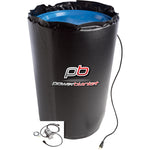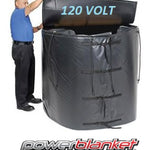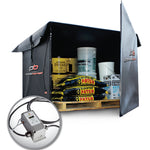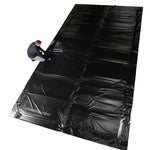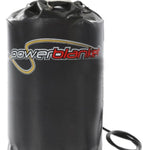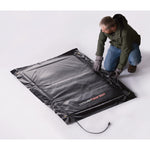You have no items in your shopping cart.
Everything You Need to Know to Prevent Your Propane From Freezing
Article At-a-Glance
What Temperature Does Propane Freeze?
Propane freezes at an extremely low temperature of -306°F (-187°C), making it unlikely to solidify under typical atmospheric conditions, but it transitions from a gas to a liquid at around -44°F (-42°C), which is more relevant for its performance in cold weather.
Key Takeaways
- Propane's Freezing Point: Propane solidifies at an extremely low temperature of -306°F (-187°C), making it unlikely to freeze under normal atmospheric conditions.
- Boiling Point Relevance: While propane doesn't freeze easily, it transitions from a gas to a liquid at around -44°F (-42°C), which is crucial for understanding its behavior in cold weather.
- Cold Weather Impact: In temperatures below -40°F, propane's pressure decreases, potentially affecting its flow and performance in appliances.
- Preventive Measures: To ensure efficient propane use in winter, consider insulating tanks, using heating blankets, and placing tanks in sheltered areas.
-
Propane Line Protection: Exposed propane lines can freeze, so insulation and heat tracing are recommended to maintain proper flow and prevent issues.
Propane stored in cold temperatures can reduce the amount of available propane and cost you money. Read this article to learn how to prevent propane loss during winter months.
Keeping Propane Flowing: A Guide to Preventing Freezing
Propane is a widely-used fuel relied upon for heating, cooking, and powering both residential and industrial equipment. However, its efficiency and availability can be compromised by frigid temperatures. Understanding the properties of propane and taking preventive measures is crucial to ensure uninterrupted service during cold weather.
A derivative of processed fossil fuels pulled from the ground, propane is most often used in its gas state. As such, it can be influenced by temperatures in cold environments. Knowing the characteristics of propane in low temperatures is key for determining how many hours a propane tank can last.

Understanding Propane's Characteristics
At What Temperature Does Propane Freeze?
Propane freezes when temperatures drop below -306°F (-187°C). Thankfully, propane doesn't freeze into a solid state under typical atmospheric conditions. Instead, it transitions from a gas to a liquid at approximately -44°F (-42°C). This property, known as the boiling point, is essential to understand, as it influences propane's behavior in cold weather.
Boiling Point and Vapor Pressure of Propane
Propane's boiling point is significantly lower than water, which means it can turn from a liquid into a gas at relatively low temperatures. Vapor pressure, the pressure exerted by the vapor phase of a substance in equilibrium with its liquid phase, plays a crucial role in propane's performance. As temperatures drop, vapor pressure decreases, potentially affecting propane gas as it flows through pipes or as it is stored in large tanks.
(If that was hard to understand, it’s OK. We’ve explained it in simpler terms below.)
Risks of Propane in Cold Weather
What Temperature is Too Cold for Propane?
While propane doesn't freeze easily, extremely cold temperatures can impact its efficiency. Think about the molecules that make up propane. In its gas form, propane molecules are spread out and fill vessels with high pressure. When temperatures drop below -40°F, propane turns into a liquid, bringing the molecules closer together and lowering the pressure of the tank. Low pressure means propane is less likely to flow through pipes for use. This can lead to reduced appliance performance or even failure to ignite.

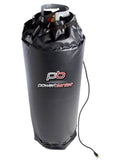
$884.99 USD
100 Pound Propane Tank Heating Blanket (120V)
For reliable propane performance during winter, consider using propane tank heaters. Heat Authority’s heating wraps help maintain consistent gas pressure and ensure your propane stays ready to use.
Protecting Your Propane Tank from Freezing
How Do You Keep a Propane Tank from Freezing?
Several strategies can help protect your propane tank from freezing:
- Insulation: Wrapping your propane tank in insulation can significantly reduce heat loss.
- Tank Heating Systems: Electric tank heating blankets or wraps can maintain a safe temperature for your tank. Consider a propane tank heating blanket for 500 lb tanks. For smaller needs, heating wraps for 20 and 30 lb tanks are available from most propane tank heater manufacturers.
- Tank Location: If possible, place your propane tank in a sheltered area protected from wind and extreme cold.
The best option is to combine the first and second strategies, where heating elements are combined with thermal insulation to provide a strong barrier against low temperatures.

Propane tank heaters, such as these models from Powerblanket, are essential to keep the gas flowing all winter long.
Can Propane Lines Freeze in Cold Weather?
Yes, propane lines, especially those exposed to elements like wind and snow, can freeze in low temperatures. Frozen lines restrict propane flow, causing similar issues as a tank with low vapor pressure. Insulation and heat tracing can help prevent propane tanks and lines from freezing.
Propane Usage in Extreme Temperatures
In extremely cold conditions, maintaining positive pressure within the propane tank is vital. For example, residents of Island Park, Idaho, who rely on propane heating to get through cold winters, often turn to propane tank warmers to prevent pressure from decreasing in their propane tanks. This is a necessity for the area, as local temperatures once hit a record low of -60°F.
The need for propane tank heating protection is real. Both homeowners and business owners in areas of extreme low winter temperatures should be using propane tank heaters if their tanks are located outdoors. Also, it’s wise to use a tank-specific heater, which can be custom built by the manufacturer if required.
Winter Care for Propane Tanks
Can You Leave a Propane Tank Outside in the Winter?
Yes, propane tanks can be left outside during the winter, but taking precautions is essential. Proper installation and regular checks can help prevent issues with leakage and low pressure. Additionally, always monitor propane levels closely and refill the tank before it runs completely empty in order to maintain proper gas pressure.
Preventing Gas Leaks in Cold Temperatures
Propane tank regulators can become brittle in extreme cold, increasing the risk of leaks. Regularly inspect regulators for cracks or damage, and avoid over-tightening connections, as this can stress components.
Propane in Specialized or Hazardous Settings
Propane is used in various specialized settings, each with its own challenges. Welders, for instance, must ensure adequate propane supply to maintain a consistent flame. Ice fishing shelters rely on propane heaters for warmth. In these environments, proper tank maintenance and insulation are essential for safe and effective use.
When using propane tanks in hazardous environments, safety should always be the top priority. That’s why some propane tank heater manufacturers follow strict adherence to national safety standards to prevent any kind of ignition due to the heater itself. Choose specific heaters for hazardous areas if necessary to ensure a safe workplace and reduce the risk of harm to employees and equipment.
Maximizing Propane Efficiency
No one wants to spend money and time on propane gas that wasn’t used. Use the list below to maximize the efficiency of your propane tanks in cold weather:
- Keep your propane tank filled to at least 30% capacity.
- Regularly inspect your propane system for leaks.
- Schedule professional maintenance of propane appliances.
- Consider using propane-specific additives designed to improve performance in cold weather.
- Use heating equipment rated for propane tanks, such as insulated heating blankets.
Don’t Be Without Heat This Winter
By understanding propane's behavior in cold temperatures and implementing preventive measures, you can ensure a reliable propane supply throughout the winter. Proper tank insulation, heating, and maintenance are key to preventing freezing and maximizing propane efficiency. Remember to consult with a propane professional for specific recommendations based on your location and propane usage.







